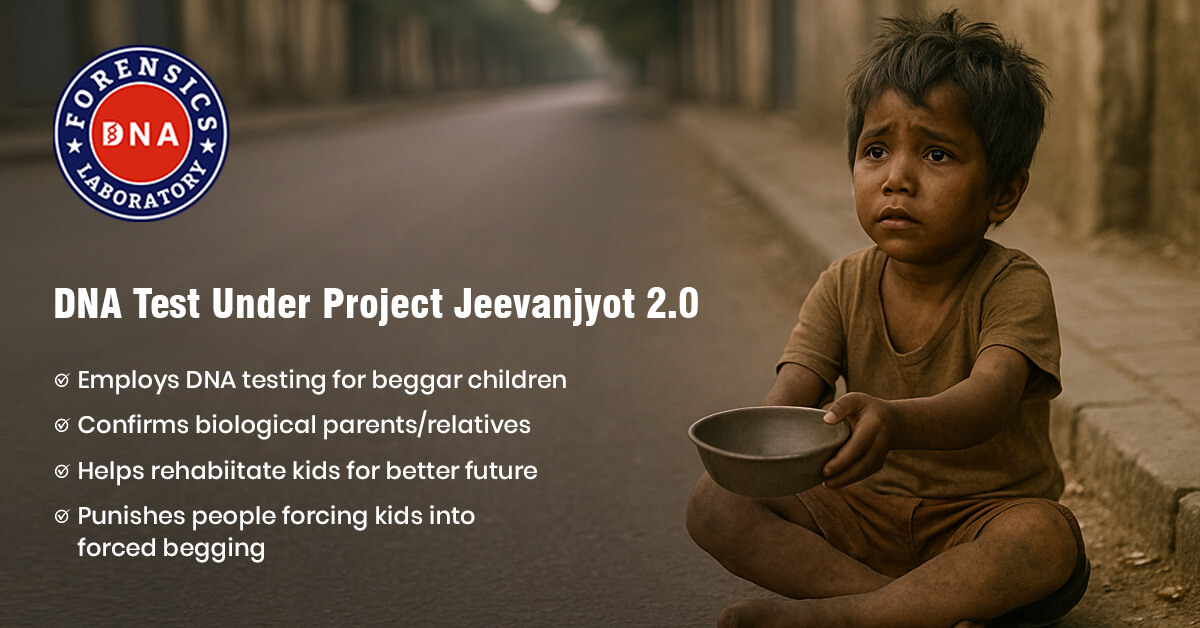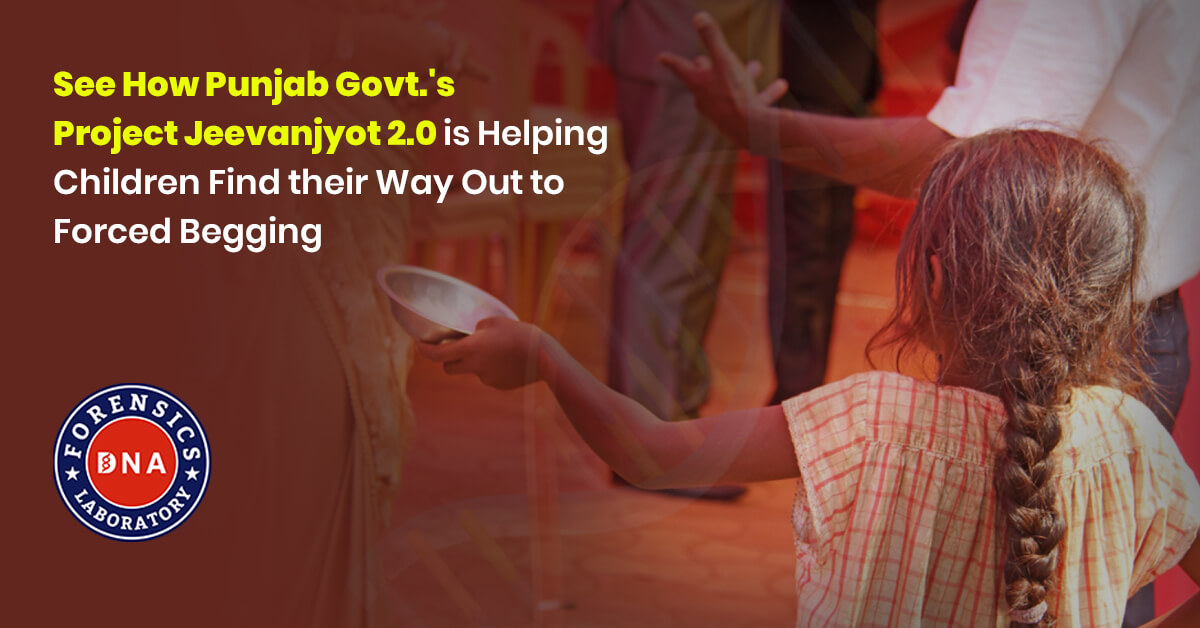Did you know that recently, the Punjab government freed 41 children from forced begging in various raids across the state?
The weapon – DNA Test!
Project Jeevanjyot 2.0 is a pioneering and commendable initiative of the Punjab government. It introduces DNA verification for children involved in begging. By integrating genetics and law enforcement, the Punjab government is presenting a unique example of how a strong political will, combined with community support, can help protect millions of children engaged in forced begging, child trafficking, and other such crimes associated with child exploitation.
This project utilizes a specialized and highly dedicated task force responsible for identifying and locating areas with possible cases of forced begging and child exploitation. Once located, the force raids the area and residences, taking DNA samples from the children and any person who claims to be the parent or relative of the child. If the DNA test reveals they are not biologically related, the adults are taken into custody and subjected to appropriate punishment as per the law. The children are rescued and rehabilitated.
History of The Project Jeevanjyot
This initiative is an extension of the earlier Jeevanjyot programme launched in 2024, introduced by the Punjab government. It introduced integrating the science of genetics, law enforcement, and community support, Punjab is setting a benchmark in child protection and welfare. The initiative also demonstrates how we can safeguard children and provide them with a secure, dignified future.
Why Project Jeevanjyot 2.0 Matters for Child Rescue and Rehabilitation
We all witness the distressing sight of children begging at traffic lights, near markets, or outside religious places. It’s a stark reminder about the critical nature of the problem and that it needs to be addressed quickly and effectively.
While some children beg due to hunger, many are victims of kidnapping, trafficking, or exploitation by their own families or organized rackets.
This is where the significance of this project comes into play. By confirming the true identity of these children, the government can shield them from exploitation. DNA testing has been key to this campaign/project by verifying the biological relationship between the adult and the child, ensuring their safety and protection from potential exploitation.
This is not just a law‑and‑order matter. It’s about protecting childhood. As a society, we cannot ignore this. Every child rescued, sheltered, and educated is a victory for all of us.
How Punjab’s Project Jeevanjyot 2.0 Works Step‑by‑Step
The project follows a clear process so every rescued child gets proper help.
Step 1: Rescue Raids
Teams go to busy areas like markets, bus stands, and railway stations where child begging is common. They identify children under pressure or with suspicious adults.
Step 2: Safe Shelter
Rescued children are taken to approved child care homes. Here, they get food, clothes, and a safe bed to sleep in.
Step 3: DNA Testing
DNA samples are collected from the child and the adult. The results confirm whether there is a biological relationship.
Step 4: Legal Action
If there’s no biological link, the adult is investigated for trafficking. Those found guilty face serious punishment.
Step 5: Rehabilitation
Children are either reunited with their real families or placed in long‑term care. They get schooling, healthcare, and emotional support.
Real Results of the Punjab Child Begging Rescue Project
The success of Project Jeevanjyot 2.0 is a beacon of hope. Between September 2024 and July 2025, over 750 rescue raids were conducted, leading to the rescue of 367 children. Out of these, 350 were reunited with their families, 17 found safe havens in care homes, and many from other states were repatriated. These numbers not only demonstrate the project’s effectiveness but also instill hope for a future where child begging is a thing of the past.
In July 2025 alone, rescue operations freed 41 children in just two days. DNA testing has already uncovered cases where adults had no relation to the child they were begging with.
These numbers show that the project is working. They also show that child begging is a widespread problem needing urgent attention.
Why DNA Testing is a Game‑Changer in Child Protection
DNA testing is simple but powerful. A small swab inside the cheeks of the child and the alleged parent/relative collects saliva or mouth cells, which contain their DNA. The DNA contains a unique genetic code. When the child’s DNA is compared with the adult’s, we can see if they are related or not.
In Project Jeevanjyot 2.0, this technology has been key. It cuts through lies and fake documents. No trafficker can fake a DNA match. This means real parents can be reunited with their children quickly, and criminals can be caught with undeniable evidence.
Without DNA testing, many children might remain in uncertainty for months. Now, with quick and reliable testing, their safety can be decided in days.

How You Can Support Child Rescue Efforts
We don’t need to be police officers or social workers to make a difference. Here’s how we can help:
- Report children seen begging or under possible exploitation.
- Avoid giving cash directly to children on the streets.
- Support NGOs and child welfare groups working in this area.
- Spread awareness about why child begging is a crime, not just poverty.
Our awareness and action can make it harder for traffickers to operate.
How Punjab’s Child Rescue Model Can Inspire the Nation
Punjab is the first state in India to make DNA verification compulsory in suspected child begging cases. This shows how combining law enforcement with science can protect children.
If other states follow this example, many more children could be saved. It’s proof that when the government, science, and community work together, even a deep‑rooted problem like child trafficking can be tackled.
The hope is that one day we won’t see children begging at every crossing. Instead, we will see them in classrooms, parks, and loving homes — where they belong.
The Road Ahead for Ending Child Begging in India
We can imagine a future where no child has to beg for survival, where every rescued child finds their real family or a safe new home.
Project Jeevanjyot 2.0 is a strong step in that direction. With political will, community support, and science on our side, change is possible. Every child rescued today is one less victim tomorrow.
DNA Forensics Laboratory Pvt. Ltd. – Providing DNA Tests for Child Protection Cases
At DNA Forensics Laboratory Pvt. Ltd., we understand how critical accurate DNA testing is in cases where parentage needs to be confirmed. While we are not directly connected with Project Jeevanjyot 2.0 or the Punjab Government, our expertise shows how such testing can be a valuable tool in similar projects and investigations across India.
When a child’s safety is in question, you want clarity and certainty. We have already been helping parents and individuals gain peace of mind through relationship DNA testing.
Moreover, we are the only private DNA testing company providing legal DNA tests for cases requiring the intervention of the honorable courts of law. We can prove the following relationships with high accuracy:
- Paternity: Father-to-child relationship
- Maternity: Mother-to-child relationship
- Siblingship: Brother-sister relationship
- Grandparentage: Grandparents to grandchildren relationship
- Avuncular relationship: Uncle/aunt to nephew/niece relationship
- Kinship: Other relationships within the family line.
With our nationwide presence through hundreds of Sample Collection Centers, you can rely on us for:
- Convenient sampling (DNA sample collection)
- Quicker testing
- Faster reporting
We are an ISO-certified DNA testing company with an NABL-accredited laboratory for DNA sample analysis.
Want to learn more about our services? Feel free to write to us at our email address, call us at +91 8010177771, or WhatsApp at +91 9266615552.


